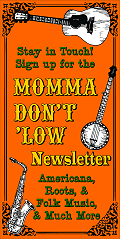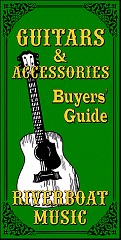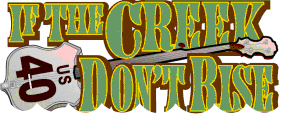
| Please Read: How to Help Our Site at No Cost to You - Some of our articles contain recommendations for products we like and vendors we personally trust. Some of those vendors may pay us a very small commission if you click on a link and buy their products. This costs you nothing at all and helps offset the costs of what we do. So if we point you to something you decide to buy later, please make certain you come back through our site and click on the link directly. Thanks. |
| This Site is a Cookie-Free Zone - Except for discussion forums that you have to expressly register for, none of our pages use cookies of any kind. Some of the vendors we link to do, but that won't affect you unless you click on a link to their pages. Your continued use of this page indicates that you agree to our policy. For details, click here. |
| Written by Paul Race for Creek Don't RiseTM |



 Are you a "Brand Bigot"?
Are you a "Brand Bigot"?
| Written by Paul Race for Creek Don't RiseTM and School Of The RockTM |
I admit that I know the value of professional musical instruments, whether they're solid-top guitars, solid silver flutes, Deering banjos, U.S. made "Teles," Mark VI saxes, grenadilla-wood clarinets or whatever. Properly cared for, pro instruments last generations instead of years, they give hard-working players courage to try things they might not try on a less responsive instrument, and they sound better for most people.
I also can't help looking at the instruments that my favorite artists choose to use in their concerts. Mostly I like seeing what someone who could, frankly, afford any instrument in the world chooses to play in public (sometimes it's surprising).
Sadly, I also know a lot of wannabe musicians and armchair critics who use the instruments they see onstage as a litmus test for how good the musician actually is, or at least for how serious they are about their music.
Does owning a professional instrument really mean you're a professional player or at least "serious about your music"? Again, there are a lot of reasons to own a good instrument if you can afford it. For non-professionals, one of the best things you can say about professional instruments is that they won't hold you back. But that's a double-edged sword. If you're mediocre on a $25 guitar, you can blame the guitar. But what if you're mediocre on a $2500 guitar?
 Now, I know a lot of amateur and professional musicians with first-tier instruments who've "earned them" in the sense that they have worked so hard on what they had that it really was time to upgrade. I've also known folks who are mediocre or - in some cases - downright lazy, but whose day job pays them so well they can afford buying instruments that give them "bragging rights."
Now, I know a lot of amateur and professional musicians with first-tier instruments who've "earned them" in the sense that they have worked so hard on what they had that it really was time to upgrade. I've also known folks who are mediocre or - in some cases - downright lazy, but whose day job pays them so well they can afford buying instruments that give them "bragging rights."
Ordinarily I ignore this dynamic, lest I be accused of "sour grapes" or singling out specific people. But I became resensitized to it when I was doing some research on vintage saxes. During my research, I was surprised how many amateur players on the web list their better horns in the "tag line" every time they post anywhere on the Internet, and then behave as though owning a saxophone worth more than their car entitles them to pronounce that everything else "sucks." I've seen "brand bigotry" with other instruments, of course, but something about these collectors continuously slamming horns that thousands of more motivated and more talented musicians are making great music on rubs me the wrong way.
As a person for whom music is an avocation, I've always avoided "upgrading" until I was sure I'd achieved all I could on the instrument in my possession. As a sax player, would I sound better on a $5000 tenor than I do on my 46-year-old Signet? Yes. Do I need a $5000 tenor to sound and play better than I do now? No, for that, I mostly need more practice. Of course for some folks, it's actually easier to come up with the cash than it is to come up with an extra 30 to 60 hours a month to practice.
When you start thinking that you can't make "real music" unless you have a ridiculously expensive instrument, think about this:
Ragtime, Dixieland, Swing, Modern Jazz, Blues, Bluegrass and (to a large extent) Rock and Roll were invented on instruments that would be considered student instruments (or worse) today. Sure, when you see the publicity photos of folks who have "hit the bigtime," you see name-brand instruments (like the famous photo of Robert Johnson holding somebody else's Gibson instead of the cheap Kalamazoo he apparently used most of his career). But most American genres of music were started on instruments that would barely be considered musical instruments today. Is that "starter instrument" really holding you back? Or is it lack of focus and being allergic to hard work?
Limitations of Pro Instruments When Playing "Live"
It's also worth considering the environment you'll be playing in. For example, the PAs and even the physical environments of most clubs and churches tend to kill any frequencies over 12kHz, so subtle differences in sound between, say a $500 and a $3000 instrument tend to be lost. And if you have to plug your $3000 guitar into the PA to get its sound into the "house," all of that beautiful tone gets filtered through the $30 pickup and $100 preamp they built into it anyway.Also, some venues don't justify dragging a $2000-$5000 instrument out night after night, or even week after week. What if you play regularly at a church, honky-tonk, house parties, jams or other low-paying or non-paying "gigs"? Places where you'll barely be heard anyway, or if you are amplified, the sound isn't exactly broadcast quality. There's a lot to be said for having an instrument that wouldn't bankrupt you if someone tripped over it or disappeared with it.
True, it's easier to find inexpensive but playable occurrences of some instruments than others. (For example, it's easier to find cheap playable alto saxes than cheap playable tenors.) But if a properly set-up student instrument will give you quality appropriate to the setting(s) you play it in, why do you need to risk something more expensive?
Will Having Less-Than-Optimum Tone Hold You Back?
That varies from instrument to instrument and from player to player. I've heard "real" players get amazing sounds out of instruments that intermediate players can barely get music out of. So what if it takes a little effort to get expression and tone out of the thing? As long as you can keep building your "chops," it serves a function. And if you do migrate to a first-tier instrument later, you'll sound way better than if you had just been using the top-line instrument as a crutch all of this time.What about Doubling?
As you might could tell, my "main" instruments are tenor sax, acoustic guitar, and 5-string banjo. So I admit to being picky about those instruments. On the other hand, I also double on several others, and play still others just for fun. I frankly don't need a $3000 soprano sax or $2500 6-string banjo to "double" on these instruments, much less to drag out of the house for "jam sessions."Yes, if someone were to give me a 1960's Selmer Mark VI soprano sax (hint, hint), I'd feel obligated to get good on the thing, but at the moment, I own my off-brand soprano; it doesn't own me. For all of its faults, I haven't really "outgrown" it yet.
Playability is Key
On the other hand, if the instrument is not playable, it will hold you back, if it doesn't discourage you altogether. Fret buzz, high action, leaky pads, sticky valves, etc., can ruin your enjoyment of an instrument. But they don't have to. A good repairperson can make most well-made student instruments almost as easy to play as the corresponding pro instruments. No, they may not be as much fun to brag about, but they'll let you learn what you need to know. If and when you do graduate to a better instrument, you'll know enough to make better choices.What about the Haters?
Back to the wannabees and arm-chair critics who'll "diss" you if you show up with something that is obviously second- or third-tier. Sadly it is a concern, especially when you're trying to break into a new venue or "scene." Many people will judge you by the visual impressions. If you're dragging a student instrument to gigs, that may influence, not only what they see, but also what they hear. Too bad. Of course, many of the same people will judge you for wearing the wrong kind of shirt or hat or facial hair. And the funny thing is, the "hipsters" who consider themselves to be on the "bleeding edge" of "next-gen" tastes and trends are usually the most likely to judge your music by something that has nothing to do with the quality of your songs or sounds at all. Let it go - even if they like you this week, they'll dump you and go looking for somebody else obscure to brag about "finding" as soon as you become popular beyond their little circle.For all of its faults, one of the positive aspects of the early "punk" scene was rockers dragging beat up old student-line instruments and amps onstage just to prove that talent - and fun - are more important than brand names. I'm a little surprised that the same "anti-status quo" attitudes toward music instrument choice never really took hold in the so-called "alternative" movement. (Of course it's possible that the guys using $3500 custom guitars to rage against everything wrong with our society are deliberately being ironic, but I don't give most of them that much credit.) It's not too late for YOU to be a trendsetter.
Depending on your market, you may need to borrow a name-brand instrument for your publicity shots. As for the rest, get good. So good you confound and shut up the haters. So good that if and when you do upgrade to a professional instrument, you'll choose the one that will actually do you the most good, and everyone around you will honestly believe you've "earned it."
And if, after everything, you're most comforable playing some beat up old thing that raises eyebrows every time you get it out of the case, so be it. (Of course I often play instruments no one recognizes, much less brands, so I may have a higher tolerance for this sort of thing than most folks.)
Conclusion
Years ago, I met a kid with an ancient plywood-topped Silvertone guitar that had an amazingly loud and balanced tone. It had a "warmer" sound than, say a new Martin, but it could hold its own in acoustic jams, even with "pro" guitars. Sadly, many "brand bigots" wouldn't bother to give the kid a listen if he came onstage with the thing today. To them the word "Silvertone" on the headstock tells them all they need to know.This was more of a rant than an article, I suppose. But I wanted to make the point that, even though a lazy or untalented musician maybe able to buy a certain amount of "good sound" and impressive appearance by shopping the first tier, a true musician can make good music out of just about anything.
You may disagree, of course. You may also have a budget that lets you fill your spare room with top-of-the-line instruments you never have time to get out of the case. But not everybody with talent and drive has that kind of budget, and, sadly, not everybody with that kind of budget has talent or drive.
Since I wrote this article, I've added memoirs that list all the various instruments I've owned or borrowed over the years, and what I learned from them and or accomplished with them. Quite a few would be would be a source of embarrassment to many folks today, but it would be far more embarrasing if someone handed me one at a party and I couldn't get a decent sound out of it. The articles are:
- Axes in My Life - Guitars, banjos, mandolins, and bases I've learned on over the years.
- Horns in My Life - Woodwinds I've learned on, mostly saxophones, including several that I did not respect as I should have when they were in my possession. These articles are on our SchoolOfTheRock sister site.
If you consider yourself a musician or want to be a musician, consider using what you have and learning what you can from it. And give the kid with the decent voice, halfway decent songs, and $100 guitar that he is getting real music out of a break.
About Creek Don't RiseTM
Creek Don't RiseTM is operating as a part of Breakthrough CommunicationsTM, the communication company started by writer and musician Paul Race in 1995. We are not a non-profit agency, although Paul and other individuals affiliated with Creek Don't RiseTM have worked with non-profit regional educational, musical, and theatrical organizations for many years.If you are interested in contributing content, asking questions, sponsoring a concert, or sponsoring a reading or production of our play, please contact us for more detailed information, for reading copies of the script, song demos, etc.
 Whatever else you get out of our pages, I hope you come away with some great ideas for "sharing the joy."
Whatever else you get out of our pages, I hope you come away with some great ideas for "sharing the joy."
And please stay in touch!
All material, illustrations, and content of this web site is copyrighted © 2001, 2002, 2003, 2004, 2005, 2006,
Note: Creek Don't Rise (tm) is Paul Race's name for his resources supporting the history and For questions, comments, suggestions, trouble reports, etc. about this page or this site, please
contact us.
2007, 2008, 2009, 2010, 2011, 2012, 2013, 2014, 2015, 2016, 2017, 2018, 2019, 2020, 2021, 2022, 2023, 2024, 2025 by Paul D. Race. All rights reserved.
Creek Dont' Rise(tm) is a participant in the Amazon Services LLC Associates Program, an affiliate advertising
program designed to provide a means for sites to earn advertising fees by advertising and linking to Amazon.com.
music of the North American Heartland as well as additional kinds of acoustic and traditional music.
Visit related pages and affiliated sites:
- Music -


















- Trains and Hobbies -






- Christmas Memories and Collectibles -






- Family Activities and Crafts -






